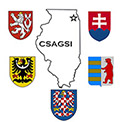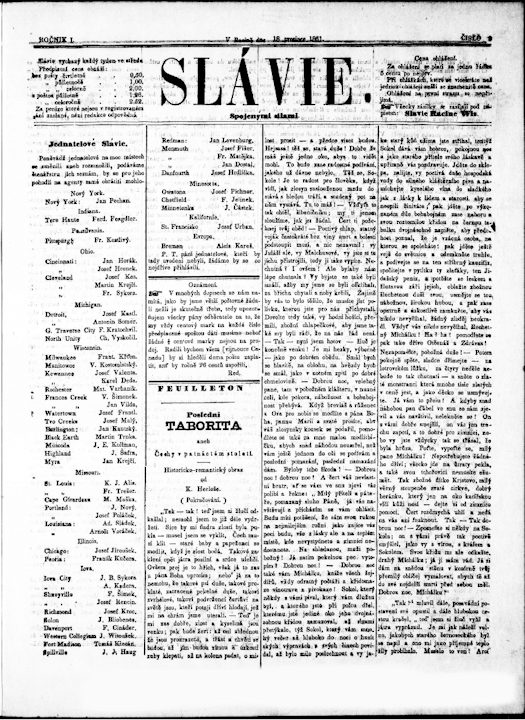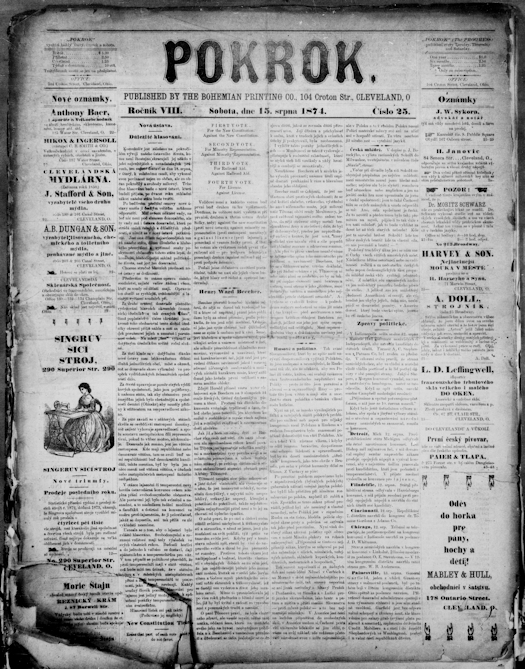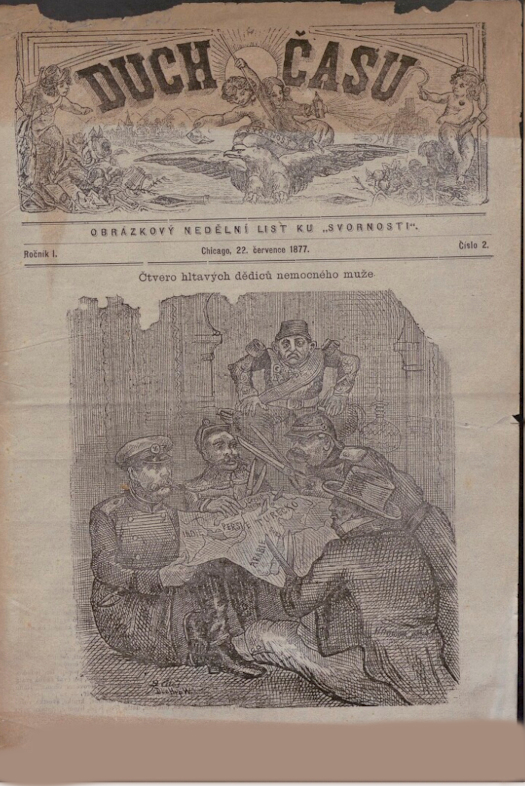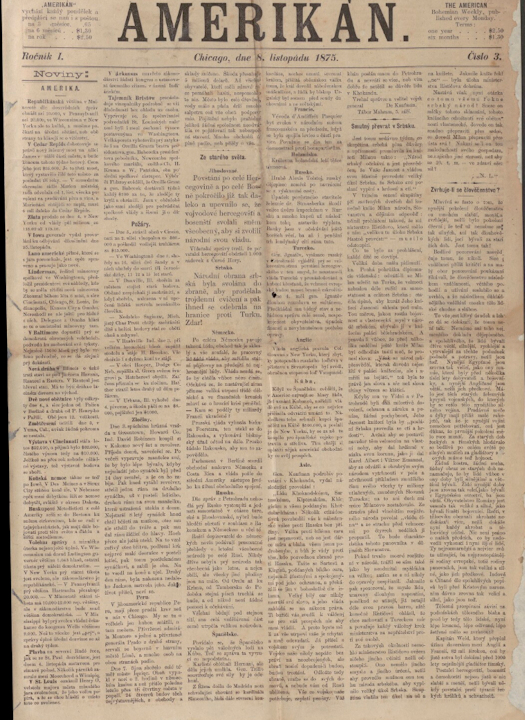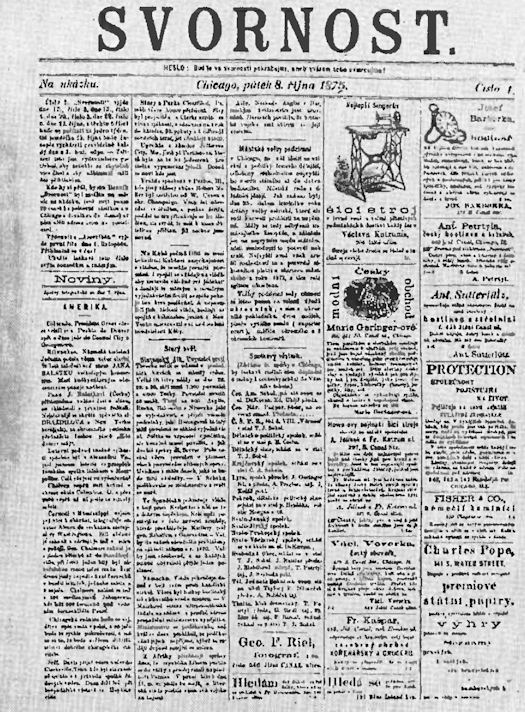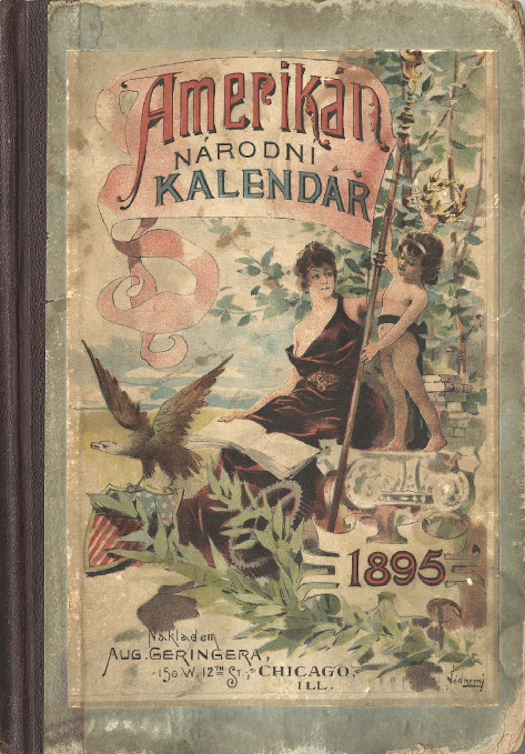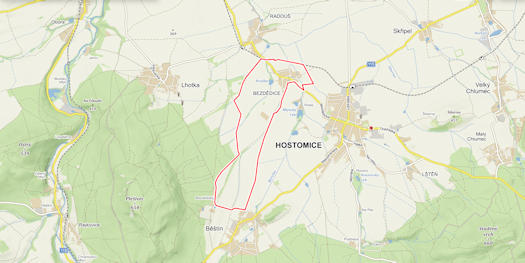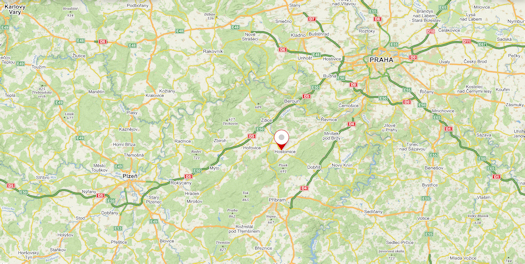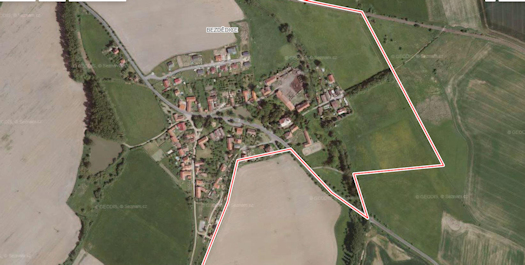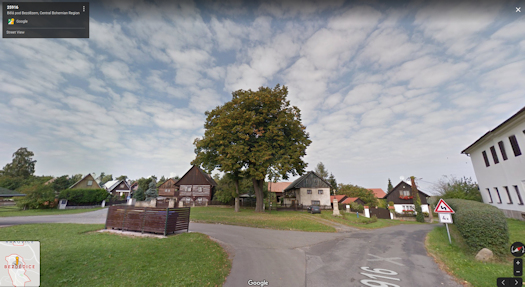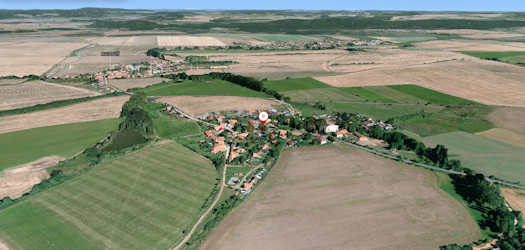Frantisek Zdrubek
Listed below are a series of articles and Internet sites which reference Frantisek Zdrubek, first editor of the Svornost (first daily Czech language newspaper in the United States) and the man who played a central role in the creation of the Bohemian National Cemetery in Chicago.
This is a rudimentary translation of the article describing the life and activities of Frantisek Zdrubek. It appeared in the 1913 Kalendar, a publication of August Geringer in Chicago. (Translation through Google Translate, decent, but not perfect)
The day of September 14, 1911, recorded in mourning letters will remain forever in the history of Czech America. On that day all the freedoms of love lured Czechs in America over the corpse of their greatest leader. The day he took Czech America the man of the immortal spirit and the golden heart of the man he is in every nation in the picture.
František Boleslav Zdrůbek, writer, editor and speaker, founder died
On Monday, September 1, Mr. Zdrůbek was still in the editorial office, where he goes daily for an hour. At noon, shortly after he returned home, he dropped to the ground, wounded by a stroke, then lived for 63 hours but in complete unconsciousness, and his death was like falling asleep. So he always wanted to die.
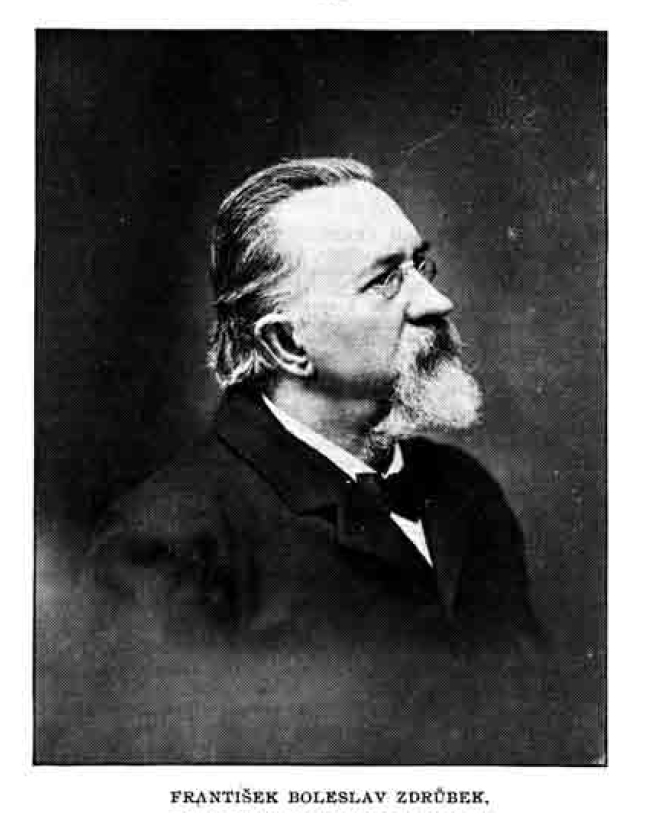 František Boleslav Zdrůbek was born on July 26, 1842 in Bezdědice near Hostomice in the Prague region. When he was two years old, they moved to Hostomice, where little Francis had careful upbringing under the guidance of his mother and father. Careful father, though poor, he took care of the good manners of his son, and before he became mature for school, he taught him to read and write, so that the little boy that since the earliest youth he had shown great understanding already in the fourth year he had read to his father from a book. Later he was held by his father, a man very pious for reading the Bible. Outside it got to the guy mainly reading historical content the father evolved into a boy base of religious direction. By eleven in his age, František attended general school. Then his parents they moved to Prague, and the boy was taken from his uncle's advice, from school and put in a net making trade. He began to learn the craft in Karlin, but when his uncle went bankrupt after six months, he went to school again at the parish school at Saint Haštala.
František Boleslav Zdrůbek was born on July 26, 1842 in Bezdědice near Hostomice in the Prague region. When he was two years old, they moved to Hostomice, where little Francis had careful upbringing under the guidance of his mother and father. Careful father, though poor, he took care of the good manners of his son, and before he became mature for school, he taught him to read and write, so that the little boy that since the earliest youth he had shown great understanding already in the fourth year he had read to his father from a book. Later he was held by his father, a man very pious for reading the Bible. Outside it got to the guy mainly reading historical content the father evolved into a boy base of religious direction. By eleven in his age, František attended general school. Then his parents they moved to Prague, and the boy was taken from his uncle's advice, from school and put in a net making trade. He began to learn the craft in Karlin, but when his uncle went bankrupt after six months, he went to school again at the parish school at Saint Haštala.
From that he later transferred to the main school at St. James and from there only as the 13 year old boy at the Old Town Gymnasium his mother and his two sisters and his father with five other kids, mostly boys, the family moved back to Hostomice, leaving František in Prague alone and also as self-reliant. The diligent boy stayed in schools with the support of friends and by teaching smaller pupils.
The direction of his upbringing was religious, and it's no wonder the sixth class entered young Zdrůbek into the monastery of merciful brothers of observation in Graz. He was brought here only by circumstances and monastic experience to think deeper about religious things, but awakening to be aware that one has to think independently and not all that is it was given to him as truth to be accepted as the truth, it surpassed him in a timely manner faith and evoked inward resistance to empty rites. Only, listening to new voices inside, he stepped out of the monastery, feeling with my own. He returned to the gymnasium in Prague and studied seventh and the eighth grade under great difficulty and terrible hardship. Then again the desire for a thorough knowledge of everyone began to awaken in him he listened to those unknown and mysterious things that religion tells us one year of Catholic divinity in Prague, but did not find it satisfaction.
Meanwhile, he met some Protestant theologians and hoping to find better satisfaction and a cleaner source of knowledge among Protestants, transferred to Helvetian confession and went to Basel, Switzerland, where he was accepted as a student of the local university. As an advanced theologian, he went to America in 1867 to serve the spiritual needs of Czechoslovaks.
As a supporter of free exploration of religious doctrines, he conceived his mission in the broadest sense, and went to America to become counselor and servant of the people to whom he is appointed spiritual leader. Therefore also, when he received the ordination of the Reformed Church on October 18, 1867, he rejected two German ones the churches that were offered to him and instead settled in Caledonia near Racine, Wisconsin to serve the two churches of the Czech-Moravian brothers he established, one in Caledonia and the other in Chicago. He traveled to Chicago every fourteen days. For that he had a small salary, barely enough to make a living, $I30 per year from each of the two churches.
His principle was to preach the purity of morals and love, sincerity in everything negotiations and national notices. He did not hesitate to rule out the principles of the doctrine those that did not compare to his views of the world. He tried, if possible, to
reconcile science with religion, but where it was not possible, clinging to science, it
is fact. Through such an activity he gained many friends and admirers, but also many enemies among those churchmen who weren't open to previews looser. But disregarded, Zdrůbek continued his activities. Restored in Caledonia Czech school and over the winter taught in it mother tongue and Czech singing. When Charles Jonas founded the freelancer in Chicago magazine "Progress", Zdrůbek became a contributor and when the magazine moved to Racine, he became editor. But before that, he had to his friends overwhelm the innate resistance to public life. It was Zdrůbek a silent worker, moving away from the noisy rush of life, not participating he liked pomp, and he remained like this all his life. If we see here after all, somewhere in front of the public, sometimes even standing At the forefront of the whole movement, we know that he has done so only in the necessary good interest things he struggled to sacrifice for his natural affections.
Taking over the magazine's editorial he stopped traveling to Chicago, staying on dutyat the Caledonian church. At that time the young worker got married. His friend, a former classmate, V. J. Sládek, well-known poet, later professor, he brought with him his trip to America Zdrubek's fiancée from Prague, Linda Raišl. The very same day when the forthcoming Mrs. Zdrůbková she arrived in Racine. On August 14, 1868, the marriage they celebrated was celebrated almost all the people there, In his bride Zdrůbek got a conscious, deeply educated woman, an enthusiastic patriot who participated in federal and public life, as long as her health allowed her, and Mrs. Zdrůbková gave her husband a total of five children, but four died at an early age and only one son, Julius Zdrůbek, is alive
Forever eternity was preceded by Mrs. Zdrůbková by her husband by six years. To her expressly wishing her corpse was burned and the ashes stored in a special a tombstone in the Czech-National cemetery, where also left a place for her husband's ashes.
When the paper "Progress" (spelled Pokrok) moved from Racine to Cedar Rapids and from there to Cleveland. (Zdrubek moved with the paper). In Cedar Rapids helped as a member Readers' Association to build the National Hall, and for some time managed amateur theatre.
There he also performed a great deed that will always be recorded in history Czech-American libertarians and Czech free ideas at all, found with the help of Boleslav Trojan, an enthusiastic worker for freedom and the Truth "The Unity of the Freedom To Unity (Free Thinkers Assoication) applied for immediately 30 Czech municipalities in different countries (states). In Cleveland, editor Zdrůbek had a trial with Czech priest Řepiš, in which he had a grievous opportunity to identify the weaknesses of the character of some of the nation.
Defeated, but not deprived of his appetite for work, left in October 1871 to Prague. He stayed there, but only 4 months and on January 26 he was back again to America, via Spain, Cuba and New Orleans to Texas. He worked at the "Houston Daily Times" as a typesetter, which work was done while editing previously learned. Then he received a call from the Czech settlement in Veselý, Austin County., for teachers' and preacher of the Czech-Moravian Brethren congregation. He arranged Czech-English school with 80 children and preached in the sense of free-thinking morality.
There he and his wife experienced many diseases. Next to the profession his compiled the New English Grammar, published in 1874 by Mr. Aug. Geringer Press in Chicago. In August 1874, Mr. E. Rosewater, publisher of the "Progress of the West", offered him the editor of the paper vacated by the departure of Mr. V. Šnajdr. He received it and arrived on September 15 via St. St. Louis to Omaha. He founded it next to editing the sheet
"Matrix of Liberty", which he published 5 books and wrote "First book for schools
American,"
It was in May 1875 when he came to Omaha to visit Chicago his friends here in Caledonia and Racine, and was also going to Milwaukee captivity. He stopped at Aug. Geringer, and he signed up for his companion on the road and they left happily together. Along the way, they discussed the need for a progressive one Czech magazine in Chicago. Mr. Geringer said he was clogging have long wished to publish a magazine as perfect and freedom as possible serving honestly if he only had someone to guide him in that spirit consistently and tirelessly. Aug. Geringer was ready to try to make it profit Zdrůbka a helper. Zdrůbek acknowledging that he could not do so in Omaha to work profusely and freely for nationality and free-thinking as if it were it was possible in the American Guild Center, Chicago, and that it would be mine through his service, he could benefit more from national and free development than he did further west, and that there is a better opportunity for the rich to self-education the city libraries, he promised that Geringer’s wish would come true, that he couldn't expect a profitable position with him in Omaha. He took the place of less profitable and larger work requiring young people to be to exert their forces in the work of merit, expressing the desire that he should be 'to do something to be the best, namely the first Czech daily, which however, Geringer was reluctant to promise, fearing, that his powers would not be enough. Zdrůbek arrived with his family in Chicago on 15 September 1875. Now it really did, if it was to be a weekly, as Geringer wanted, or a dialy, as Zdrůbek wanted. Most friends of both businessmen were also in favor dialy. Enthusiasm for the matter, young power-Geringer and Zdrůbek were equally old, just 6 days from self-entrepreneurship on one side and perseverance on the other side, all of this was taken into account and decided. Immediately started in the printing house with preparations for the first Czech daily newspaper in America. Zdrůbek wrote a reading, collecting announcements for the first number and began to bet. The daily newspaper was named c, Svornost ", and a weekly "American".
Great worry, work, get started. The publisher took the family savings of $1500 accumulated hardworking for six years of hard work together they saved. He bought fonts, supplies, molds, boats, paper, and more it is needed in the printer if it was not already in the "job" printer. The first issue of the first Czech daily in America was published on 8 October 1875, second 12, and third 15, October, then continued when all the workers they got used to the work and 'could sort it out, except on Sundays.
And since then, Mr. Zdrůbek has remained in the editorship of "Svornost" and "American" "as the chief editor and the advances that the paper has since witnessed, that he was a man walking with the spirit of the times. Hard times were from the beginning and after many more years to endure the publisher and the editor who initially catered all the editorial work alone, he went through all the trouble with him. But they tolerated it all determinedly, always following the means of honest ways, in consciousness that the righteous thing must prevail. But it took years and hair
on their once exuberant heads they began to lash out before being devoted and determined men worked out other rewards for their hard work than they did they were internally satisfied.
Not long after the founding of Svornosti gave Zdrůbkem founded Svobodna Obec "Free The municipality "to record at the state offices as a religious organization of free minds and elected its founder as chairman and speaker. In this the office in which he was entrusted with the right to indulge in law, remained Mr. Zdrůbek until his death. The Free Municipality loses in him the man who was her soul. He did not require any fees for his services, on the contrary, where it was even though he has contributed. .
As the executor of various necessary ceremonies, such as indulgence, speeches at he always left the will, name and so on to everyone who was his He wanted to replace time, and gave something to the poor rather than pay them took. He proclaimed good and generosity not only in words but also in deeds. But in this gentle, good-natured nature, he was intrepid, firm, indeed a hard and stubborn fighter for the ideas he considered correct, especially for freedom of thought. He resolutely challenged his adversaries and often ruthlessly.
On 17 and 19 April 1877 he organized two public religious debates with the militant and eloquent priest at St. Prokop in Chicago, Father William Čoku. Czech-American historians often doubt that it would be the debates had some positive outcome that it would be one or the other the speaker convinced the other party. Even if they are right, it is undeniable, that the agenda was delimited and in some words marked in the debate
then a free-minded party among Czech-Americans and that public debate they to the self-confident and open behavior of unbelievers and the unification of the free-mindednoticeably contributed.
It should also be remembered that Mr. Zdrůbek was one of the main founders of our National Cemetery and that it was he who put the first proposal on its establishment. In a lecture held in the hall of Gymnasium Jednota Sokol on 7, January 1877 spoke of the need for a national cemetery for the Czechs and since then the idea was worked with his help until it was actually done. It would be endless to list all the merits of the man who gave us left for an empire from which there is no return. Let's discuss the history of the Czechs of America, almost from their beginnings and everywhere we meet his name and we find work everywhere beside his name.
In his private life, Mr. Zdrůbek was a model of a man of silence, a gentle one who never hurt anyone by saying anything, he had a benevolent word and a friendly face for everyone. He loved his small family with all my soul, and it's been since the death of his wife, until finally on January 8, 1906, she died, dated the apparent decline in his state of health. It's been four years since he got so serious, that there was doubt about his healing. But the otherwise strong body system has overcome the malignant disease and will keep it for the next few years. But he had to save himself and be careful.
He has seen an age not far from seventy when a man has no regret to be He says goodbye to the world, and his death was quiet, calm, as death is called just. All his Czech-American papers brought reports on his death his merits and namely his nice nature. The news of his death was also wired by the Czech-American Press Office to Prague's magazines. The grieving survivors received a large number of condolences from all sides of the United States.
Freelancer Chicago 'sent out to her leader and teacher on 17 September a funeral over which the more famous and dignified Czech Chicago has not yet seen. The funeral took place from the hall of the Czech-English Free School, where the deceased so often yelled, in the middle of an entire grove of flowers and daisy all was placed before a stage of a coffin with the remains of the deceased when the hall doors opened, so that the audience can enter. Members of the Free Community in full they stood by the guard of honor and looked after, about order in the hall. Audience entering the main entrance, stopping at the coffin 'and leaving the exit lateral. The moving moments were when the children came in the procession of their teacher from various free-thinking schools, some of which laid palms on the coffin with ribbons. The hall was filled to the last spot. The movement was obvious faces of all. All eyes fixed on the coffin with the coffin when half past at twelve, the hall was silent at first; then more and more intensifying but soft sounds funeral songs of Czech-American singing quartet.
After that, the President of the Lincoln Order No. 52 CSPS spoke. Mr. Frank J. Nadnerny and read one of the speeches that was 'dead' for CSPS orders. Goodbye with the dead members he wrote and 'which fit entirely with this mournful event.
And it stood at the coffin speaker of the Religious Religious Society M. M. Mangasarian, a free-thinking philosopher of the name of the world who considered American He came to pay homage to the memory of the late Comrade and say goodbye with him. Mr. Mangasarian, also an already white-haired man, over whose head he too many bitter trials and adversity passed on, spoken in English a speech that trembled deeply within those who understood it. It was words spilling out of the heart of compassionate, aware of the loss, already Czech-American the liberators suffered.
An old friend of the deceased, L. J. Palda, who deliberately, although ill, came from
Cedar Rapids say goodbye to a dear friend, a voice trembling, several times in a vainly suppressed sobbing, he spoke of the personal the qualities, merit and difficult life experiences of the deceased.
For the publishers of "Svornosti" and "Amerikán" as well as for the editors of both
for their readers who were not otherwise represented at the funeral, spoke Editor R. Jaromír Pšenka. Then, on behalf of the Free Community, of which the deceased was founder and for the duration of the chairman and speaker, spoke Dr. Frantisek. Iška.
Another speaker was Dr. Salaba Vojan, who spoke over the coffin of space
Czech-American journalism on behalf of the Czech-American press, all of the deceased's colleagues. for Sokol Slov. Lipa, whose church was the deceased founder and for many years an honorary member, spoke the words of farewell br. Zárobský, and ceremonies in the hall ended with singing of the Czech-American Quartet, who chose a suitable song for this occasion: "Who's burning for the truth in holy enthusiasm, "and while those present came out of the hall, moving away around her coffin, two of her stanzas with a fervent sensation.
The procession, which went after the assembly from the School to 18th Street to Ashland Avenue, was touchingly impressive. Thousands of people lined the sidewalks of 18th Street, the same street along which the deceased so often went to "School" to meet and lectures.
In front of the procession, there were children from Czech liberal schools in procession of their teachers. The girls were dressed in white dresses with mourning straps on his arms. For a long line of school children and beyond the carriages with flowers walked in full with the members of the Free Community, with the same badges on arms. An elected committee of the Free Community members went by a wagon with a casket of lace. The members of Sokol Slavonic Lipa were behind the coffin. Behind them are carriages with family members, friends and carriages for the members of Svoboda
Municipalities. Forty-four carriages escorted a hearse on the way to the cemetery.
It was a strange coincidence - just as this dignified procession went by Saint Prokop –started ringing the tower bells - we do not know what opportunities. To many of the funeral participants, it seemed as if those whom Zdrůbek had been a mighty and dangerous adversary throughout their lives had paid homage to his pure character in a sacred time.
A moment of homage to his pure character. Meanwhile, thousands of people crowded in the cemetery. By notice of the cemeteries were not yet a day except for the graveyard decorating day when there would be such a flood of humanity in the cemetery.
Everything went to the monument Klácelov, where other friends of the deceased and
representatives of the associations were to say goodbye to the deceased. When the coffin procession arrived, mankind was around the monument to Klácelov. in front of whose face the coffin stood on her cataphor, around the open even on the lawn among the graves to thousands. The singers set their mourning choir on, and Mr. Jan Pecha spoke as personal friend of the deceased and representative of the Czech-National Cemetery and cordial in words he reminded that Czech Chicago is obligated to the deceased man, Gratitude for having today 's pride, one of the most beautiful cemeteries in Chicago, because he came from the initiative for this business.
On behalf of the falconsspoke the organizer of "American Sokol", Dr. Rudish-Jicinski severalenthusiastic words to commemorate the man who encouraged his featherfalconry brothers to fight for the most expensive goods, mental freedom.Kollega Bartoš Bittner on behalf of the journalists who worked with the deceasedeven those who had met him in journalistic life spoke warm wordsof the integrity of the character of the deceased and of his mild nature, which for no onehad no harsh words, and he was kind to everyone.
On behalf of the Grand Master of the Taborites and the National Master of the Organization Mr. Václav Soukeník spoke the words of appreciation and farewell. The ceremonies are overwas the speech of Mr. Jakub Hroděj, who spoke behind the bed of "Božena Němcová",No. 1022 R. and D. Honor and the funeral song of the quartet. At this the audience invited Mr. Pecha to those who want last looking into the face of the deceased, they walked outside his coffin. Almost half an hour this march of worshipers of Zdrubek continued around his calm face, upside down to the clear sky, amidst the splendor of nature, beginning to change colorswith autumn. How beautiful, magnificent, great man's dignified funeral prepared by the great Czech Chicago to your good friend!
The corpse of the deceased, when the people parted, was taken by the Free Community members to the cemetery chapel, where it remained until the next day transported to the nearby Cemetery Montrose to the crematorium to burn. Burning in the crematorium performed on Tuesday 19 September in the presence of R. J. Pšenka and J. Buňaty, initially also the son of the deceased and his wife.
The second. On that day, the ashes were deposited next to the ashes (wife) Zrobůbkové to tomb of stone at the Czech-National Cemetery in Chicago.
Frank Zdrubek
Article in the CSAGSI Journal - September 2011 Vol. 15 No. 4 Koreny Page 7-8
Submitted by Paul Nemecek
Note: The information below appeared in the Chicago even the most ardent Catholics. Czech newspaper, Denni Hlasatel, September 18, 1911. It tells of the funeral of the prominent Czech-American freethinker and teacher of the people, president and spokesman for the Alliance of Freethought, founder and main editor of Svornost and Amerikan Czech publications who died September 4, 1911.
The funeral was held from the Cesko-Anglicka Svobodna Skola (Bohemian American Liberal School) on Eighteenth and May Streets (Pilsen neighborhood, Chicago). The body lay in state in the center of the hall and hundreds of people filed past to pay their last respects to the deceased who was departing forever for eternal rest, after many years of hard work. The stage was crowded with floral pieces, while the coffin was covered with a simple laurel wreath.
After all the speakers had arrived, the Cesko-Delnicky Pevecky Sbor (Bohemian Workingmen’s Singing Society) sang the dirge, “Co Placete” (Why Do You Weep?). Then the president of the Lincoln Lodge, C.S.P.S., Cesko Slovanska Podporujici Spolecnost) (Czech-Slavonic Benevolent Society), of which the deceased was a member, addressed the gathering. Mr. M.M. Mangasaian, well-known freethinker and lecturer of the Svobodna Obec Rationalistu (Rationalist Community), a personal friend of the deceased and a fighter for the same ideal, then appeared. He called attention to the great merits of our deceased countryman, that fearless, persistent defender of rationalism, that fighter for the spiritual and political freedom of his countrymen. “For almost half a century he cleared the way for the Rationalist idea. Mr. Zdrubek was a Catholic, but in his twenty-first year he awakened from a deep dream and forced his way to the light of spiritual freedom. After him, came those others who today mourn beside his coffin. With all his energy, he threw himself into the open arms of the Rationalist idea.” The speaker recalled Mr. Zdrubek’s debates with Father Vilem Coka, at which time, because of his quiet and scholarly appearance, he gained the respect and admiration of even the most ardent Catholics.
The next speaker was Mr. Lev Palda of Cedar Rapids, Iowa, an old friend and fellow worker of the deceased with whom he had worked a great many years upon the national field for the enlightenment and spiritual freedom of his countrymen.
Mr. Jaromir Psenka then spoke on behalf of the publishers of the Svornost newspaper, and described the rare character of the deceased. He reminded the people that with the departure of Mr. Zdrubek, a breach, which will not be filled so soon, was created in the ranks of the liberal minded Bohemians (freethinkers).
Dr. Frank Iska spoke for the Svobodna Obec (the rationalist community). The services at the hall were concluded by Dr. Jaroslav E.S. Vojan, manager of the Cesky Tiskovy Kancelar (The Bohemian Press Bureau).
At the cemetery, the rites were opened by Mr. John Pech, president of the Bohemian National Cemetery. He was followed by Dr. John Jicinsky of Cedar Rapids, Iowa, who spoke in behalf of the Narodni Jednota Sokolska (National Sokol Union). Mr. Joseph Egermayer, president of the Cremation Society, was the next speaker. He expressed regret over the fact that the deceased did not live long enough to see the realization of a Czech crematorium, although it has been decided already that a new crematorium of the most modern type will be built in the Bohemian National Cemetery.
Notes:
- The burial urn for Frantisek B. Zdrubek is buried in Bohemian National Cemetery, Chicago. His ashes are located in Klacel Circle, a burial space of special recognition at the cemetery for leaders in Czech-American history.
- The editorial in the Svornost newspaper the same day stated: “This is the kind of man fate took from us today. The pen in hand quivers, and trembling with tearful eyes, I look at the empty corner of his office, where daily, for so many years, our beloved editor sat. Although the past several years he came only for an hour daily. That lone desk, that empty chair will remind us of the deep loss we have suffered, and with us all Czech America, actually the entire Czech nation.”
Denní Hlasatel -- September 14, 1911
Frantisek Boleslav Zdrubek Is Dead
Shortly after three o'clock this morning Mr. František B. Zdrubek died at his home, 4010 Grenshaw Avenue. From the very moment he was stricken with paralysis in the left side of his body the doctors feared this outcome despite the fact that he fought bravely for his life. Since Monday, when he was stricken, Mr. Zdrubek, regained consciousness only once, and then only momentarily.
By the death of Mr. Zdrubek, one of the best known and most deserving of men was torn from our midst. Mr. Zdrubek, as a newspaperman, as a liberal-minded man, and as a patriot, ranked in first place among us, and today even those who were his opponents bow their heads respectfully beside his bier. The details about the funeral have not yet been decided upon. The deceased is survived by only one son. The son, together with his wife and young daughter, lived with his father on Grenshaw Avenue.
Mr. František Boleslav Zdrubek was born on July 26, 1842 in Bezdĕdicích, Hostomic, Bohemia. He graduated from the gymnasium [High School] and then studied theology in Prague. Later, he studied at the Protestant Seminary in Basel, Switzerland. He arrived in Chicago in May 1867. Soon he dedicated himself to newspaper work, and edited the liberal-minded [Free Thought] Pokrok in Racine, Wisconsin. In 1869, this paper moved to Cedar Rapids, Iowa, and in 1871 to Cleveland, Ohio. In 1874, he became editor of Pokrok Zapadu in Omaha, Nebraska, and in October 1875, he was editor of the Svornost in Chicago.
Mr. F. B. Zdrubek can really be considered as founder of the liberal-minded [Free Thought] party in America, and especially in Chicago. He worked for it by word of mouth and in writing. He published the Svojan and in addition wrote many articles, the purpose of which was to teach our countrymen liberal-mindedness and the English language. He also published several text books for the youth attending Czech [Free Thought] 3schools. He was an enthusiastic, tireless worker, the like of which are seldom found. That which he considered right, and which he defended without regard aroused many antagonists.
Much remains after Mr. Zdrubek which insures his continued remembrance by all American Czechs.
Denní Hlasatel -- September 18, 1911
The Frantisek B. Zdrubek Funeral Gigantic Crowds of People in the Hall, the Streets, and at the Cemetery
Yesterday, Chicago's liberal-minded Bohemians [freethinkers] attended the funeral of one of the foremost Czechs, Nestor of Czech journalism, writer, speaker, and journalist, Mr. František Boleslav Zdrubek, president and speaker of the Svobodna Obce (Rationalist Society). Mr. Zdrubek was a member of many other national societies; a man outstanding and meritorious in every respect, editor and founder of the first Czech daily in America, Svornost, and of the weekly, Amerikan, etc. The funeral of the deceased was a most phenomenal one. By this gigantic participation, the people demonstrated their recognition of the deceased for his inestimable merits on the national field, as a pioneer of Czech journalism, and as a fearless and persistent fighter for the Rational cause.
The funeral was held from the Cesko-Anglicka Svobodna Skola (Bohemian-American Liberal School) on Eighteenth and May Streets. The body lay in state in the center of the hall and hundreds of people filed past to pay their last respects to the deceased who was departing forever for eternal rest, after many years of hard work.
The stage was crowded with floral pieces, while the coffin was covered with a simple laurel wreath.
After all the speakers had arrived, the Česko-Dělnícký Pěvecký Sbor (Bohemian Workingmen's Singing Society) sang the dirge, "Co Pláčete" (Why Do You Weep?). Then the president of Lincoln Lodge, Č. S. P. S., Česko Slovánska Podporujici Společnost (Czech-Slavonic Benevolent Society), of which the deceased was a member, addressed the gathering. Mr. M. M. Mangasaian, well-known freethinker and lecturer of the Svobodna Obce 3Rationalistu (Rationalist Community), a personal friend of the deceased and a fighter for the same ideal, then appeared. He called attention to the great merits of our deceased countryman, that fearless, persistent defender of rationalism, that fighter for the spiritual and political freedom of his countrymen. "For almost half a century he cleared the way for the Rationalist idea. Mr. Zdrubek was a Catholic, but in his twenty-first year he awakened from a deep dream and forced his way to the light of spiritual freedom. After him, came those others who today mourn beside his coffin. With all his energy, he threw himself into the open arms of the Rationalist idea." The speaker recalled Mr. Zdrubek's debates with Mr. P. Cokou, at which time, because of his quiet and scholarly appearance, he gained the respect and admiration of even the most ardent Catholics....
The next speaker was Mr. Lev Palda of Cedar Rapids, Iowa, an old friend 4and fellow worker of the deceased with whom he had worked a great many years upon the national field for the enlightenment and spiritual freedom of his countrymen.....
Mr. Jaromir Pšenka then spoke in behalf of the publishers of Svornost, and described the rare character of the deceased. He reminded the people that with the departure of Mr. Zdrubek a breach, which will not be filled so soon, was created in the ranks of the liberal-minded Bohemians [free-thinkers].
Dr. Frank Iska spoke for the Svobodna Obec (The rationalist community).....
The services at the hall were concluded by Dr. Jaroslav E. S. Vojan, manager of the Český Tiskový Kancelař (The Bohemian Press Bureau).
At the cemetery, the rites were opened by Mr. John Pech, president of the 5Bohemian National Cemetery. He was followed by Dr. John Jicinsky of Cedar Rapids, Iowa, who spoke in behalf of the Narodni Jednota Sokolska (National Sokol Union).
Mr. Joseph Egermayer, president of the Cremation Society, was the next speaker. He expressed regret over the fact that the deceased did not live long enough to see the realization of a Czech crematorium, although it has been decided already that a new crematorium of the most modern type will be built in the Bohemian National Cemetery.
Mr. Bartoš Bittner, a colleague of Mr. Zdrubek, then gave a short talk in behalf of the Czech journalists of Chicago.
The rites at the cemetery were concluded by Mr. Soukup and Mr. Hrodět.
The body was then taken to Mount Rose Cemetery for cremation.
Denní Hlasatel -- 11 September, 1922
To Honor the Memory of F. B. Zdrubek
.Zdrubek. The memorial services were organized by the Svobodna Obec (Bohemian Free Thought Community), the Illinois ...
The large assembly hall of the crematory at the Cesky Narodni Hrbitov (Bohemian National Cemetery) was filled by our countrymen yesterday who came in spite of rain to honor the memory of F. B. Zdrubek. The memorial services were organized by the Svobodna Obec (Bohemian Free Thought Community), the Illinois Grand Lodge of the Cesko-Slovanske Podporujici Spolky (Czecho-Slavonic Benevolent Societies), the patronat Zdrubkovy Skoly (managing board of the F. B. Zdrubek [Bohemian Free Thought] School), the Sokol Tabor Slovanske Lipy, and the Lincoln Lodge of the Spolky of which Zdrubek was a member.
The program arranged for the occasion pleased everyone. Mr. S. Erst's playing of the organ was very artistic and filled the pauses between the numbers on the program. Mr. B. Simecek, vice-president of the board of delegates to the Hrbitov, was in charge of the ceremony. He opened the program with a very 2fine address, and was followed by Otto Pergler, president of the Grand Lodge of the Spolky; Josef Lang of the Sokol; and Vaclav J. Petrzelka, the official orator for the Svobodna Obec ([Bohemian]Free Thought Community). All of these men spoke about the significance of Zdrubek's work and made suggestions as to how to continue the work begun by him. After the conclusion of the program the entire gathering went to Klacel's monument near which is located the urn containing Zdrubek's ashes. A beautiful wreath, which was donated by the board of delegates, was placed upon the urn. Mr. V. Rehak, secretary of the Obec, and Mr. Petrzelka, its official orator, spoke again, and the services ended. Among those who attended were a number of old timers, men who had belonged to the Free Thought movement for many years. Many children of the Zdrubek School were also present, accompanied by Mrs. Raeck, a teacher in that school.
Denní Hlasatel -- 12 September, 1921
In Memory of Zdrubek
A ceremony to honor the memory of Fr. B. Zdrubek, during which a memorial plate donated by the board of representatives of the Cesky Narodni Hrbitov(Czech National Cemetery) was unveiled, took place at that cemetery yesterday afternoon. The celebration was arranged by the Ceskoslovenska Svobodna Obec (Congregation of Czechoslovak Freethinkers) and the board of representatives of the Cemetery in co-operation with the Grand Lodge of the Ceskoslovenske Podporujici Spolky (Czechoslovak Benevolent Societies) of Illinois and the Sokol unit of which Zdrubek was a member.....
The ceremonies started at two o'clock in the great hall of the Crematorium with an organ interlude played by Mr. Stepan Erst, who also played between the several sections of the program. The chairman of the board of the Narodni Hrbitov, John Pecha welcomed the participants, who arrived in numbers fully adequate to the importance of the ceremony, and introduced the speakers, Dr. Anton Mueller and Jos. Lang.....
Mr. Lang, a Sokol and an ardent worker in all of our loftiest causes, especially the pursuit of the principles of the founders of our Sokol movement, Fuegner and Tyrs, after an appraisal of Zdrubek's activities, bitterly complained that the delegation from Czechoslovakia which came to attend our Slet (Sokol mass convention) advocated a change in the constitution of our Sokolska Obec (Sokol Community) which has resulted in the throwing overboard of all that our Sokols have been preaching for fifty years, and for which they are still fighting. Mr. Lang's speech met with the approval of the public, who evidently agreed with him. No doubt this matter will be considered in due time and at the proper places.....
Mr. Vaclav J. Petrzelka, speaker of the Svobodna Obec, talked about the credit that is due to Zdrubek for his initiative in the founding of the Narodni Hrbitov, and for his efforts toward the propagation of the ideals of the Free Thought movement..
The Inter Ocean, Chicago, Illinois, September 15, 1911
“Frank B. Zdrubek, dean of the Bohemian journalists of Chicago, died yesterday morning. He had been stricken with apoplexy Monday afternoon andhad not regained consciousness. Mr. Zdrubek was born at Hostomic, Bohemia, on July 26, 1842. Having studied theology in the University of Basel, Switzerland, he was ordained a Protestant minister when he came to America in 1867. In May 1875, he founded as editor in chief, the first Bohemian daily newspaper in the United States, the Daily Svornost, with August Geringer as publisher. This post he held until last Monday. He was author of many scientific books, Bohemian-English dictionaries, and the "Bohemia-English Interpreter. His son Julius survives him. The funeral will take place from the Bohemian School hall, 1126 West Eighteenth Street, Sunday, at 11 a.m. The body will be cremated at Montrose Cemetery and the ashes buried at the Bohemian National Cemetery, of which he was the founder.”
Newspaper Articles - Obituaries from out of state
The Iowa City Press-Citizen – Obituary September 15, 1911
Bohemian Editor Dead at Chicago
Bohemians in this city received the sorrowing news that Frank B. Zdrubek, the prominent and well known editor of the “Svornost”, the best known Bohemian daily paper in the country, had died at his home in Chicago. He was one of the greatest students in the country, his literary works being very prominent in Bohemian writings.
Frank B. Zdrubek was born Bezedic in Bohemia, on July 26, 1842. He was a zealous students and was ordained a Catholic priest. He was a student for several years in a Monastery and a philosophist. He finally became a protestant, and spent some time in studying in Switzerland. In 1867, he came to the United States. After a hard struggle he propagated free thought in America. One of his first and greatest works was the Bohemian-American dictionary. He also wrote many articles and books of a religious character.
In 1868 he became editor of the “Pokrok” a well-known publication in Racine, Wis. Soon after he became editor the paper was moved to Cedar Rapids and published there. In 1871 Mr. Zdrubek went to the old country remaining there until September. When he returned he accepted a position on the Houston Daily Times. In 1874 he moved to Omaha and finally settled in Chicago. With Aug. Geringer, they published the “Svornost,” a daily paper, “Dutch Casu” a weekly publication and the “Amerikan”.
The Cedar Rapids Iowa Gazette – Obituary September 19, 1911
Many At Funeral Of Noted Newspaperman
Bohemian Organizations Pay Tribute to Life of Frank B. Zdrubek, Who Died in Chicago
The local delegation to Chicago to attend the funeral of Frank B. Zdrubek, the Bohemian author and editor, who passed away at his home in that city last week, returned yesterday and report a mammoth gathering of those by whom the deceased was revered. Besides the delegation sent by The Free Thought congregation, there were many others from this city and vicinity present at the funeral. President M. O. Hasek, Vice President C. K. Kosek, Speaker J. J. Hajek, F. Pesek and Dr. J, Rudis -Jicinky were those representing the local Organization.
The funeral was impressive and was two hours in length, being held, at the Bohemian-American school on West Eighteenth street- By 10 o'clock the building was crowded to Its capacity, and the streets outside were blocked with thousands of people who could not enter.
The floral tributes to the deceased were profuse. One of the features of the display was a large open book on which the name of the deceased was inscrolled, and in which were inscribed some of his greatest works in literature. President Mangesarlan, of the Independent Order of Free Thought of Chicago, spoke in English, and Hon. L.J. Palda of this city spoke in Bohemian. Another speaker was Master Psenka, a member of the staff of the Svornost, of which the deceased was editor. Dr Vojan talked on the life of the great Journalist and Dr. Frank Jaka and several others made short addresses.
Interment was made in the National Bohemian cemetery, and the funeral procession from the place of funeral to the cemetery was many blocks long, hundreds of carriages being in line. At the cemetery the burial services were conducted before the monument of, Professor Klacel, in which several more impressive addresses were made, among the speakers being John Pecha, president of the C.S.P.S. of the United States. Dr. Jicinsky of this city also gave an address, representing the Sokols of the United States, and B. Bittner spoke in behalf of the newspaper fraternity. The addresses were interspersed with singing by a quartet. Following the service the body was delivered to the crematory where It was cremated yesterday. T
he deceased was known by many in this city and was loved by all who had met him. To show their appreciation of the value of his life and sorrow over his death the local Sokol organization sent to the bereaved family a letter of condolence.
Zdrubek Obituary – Kanaske Rozhledy Wilson, Kansas 9-20-1911
Full page obituary (Google Translate used for this - does a decent, but not a perfect job.)
One of the first pioneers of liberalism Czech American journalist and revivalist of all Czech people in America, in the sense of narrower and broader man, whose name was perhaps known to every guild in the part, Frantisek Boleslav Zdrubek is dead.
His fault was caused by a stroke, which was suffered last week after returning from the usual occupation of his editorial office "Svornosti", whose co-founder and leading spirit would after all years of its duration, in bad and good times. The rumor of Zdrubek's death will surely be difficult to apply to anyone sincerely free-minded, for even with the inevitable trainings that each progressive movement brings with him, Zdrubek has succeeded in gaining reverence and seriousness in his principles and in the tenacity of his knowledge. It is apparent that he was embarrassed with disrespect, even though he was a stubborn and hard-faced opponent, bound by his ecclesiastical tabernacles. Surely it would not have been so much offensive to Zdrubek in his life, whether his writers' adherence to the church or blind spirits were dictated.
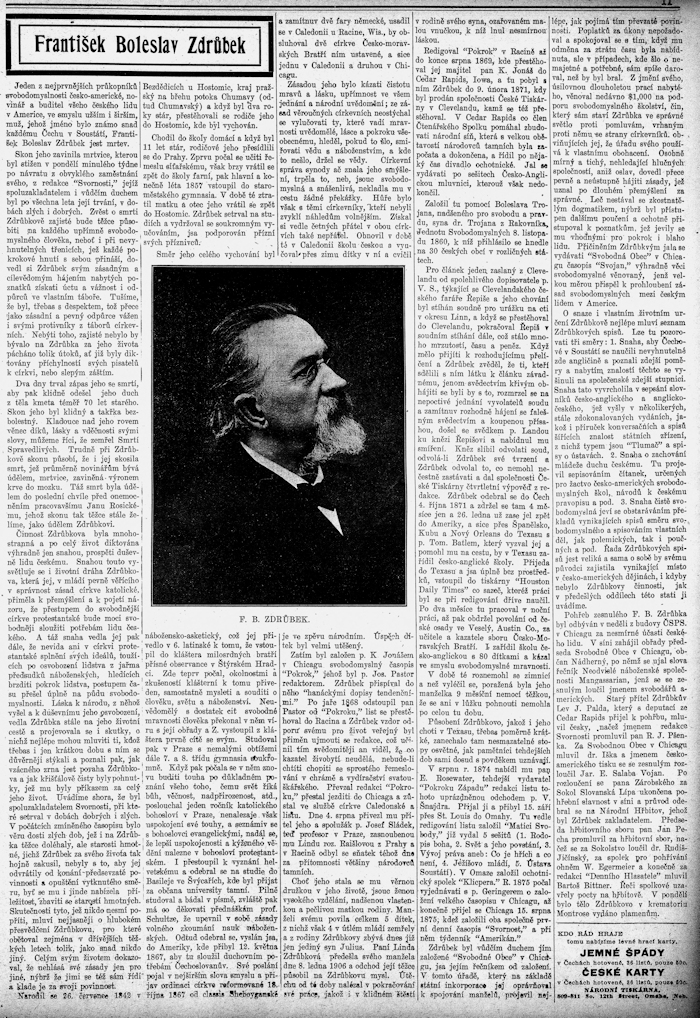 It took two days to fight his death, then abv then quietly sent his spirit from the body of the sword almost 70 years old. The end of his would be calm and almost painless. Putting above him his vanity, thanks to love and gratitude in his words, we can say that he died of the Righteous. Poor at Zdrubkova's death, it also fell death, which is an average journalist is a wicked, stroke caused by the blood flow to the brain. The death was also done, until the last moment before the occupational Jan Rocicky's illness, whose death is as hard as ever, as he did to Zdrubek.
It took two days to fight his death, then abv then quietly sent his spirit from the body of the sword almost 70 years old. The end of his would be calm and almost painless. Putting above him his vanity, thanks to love and gratitude in his words, we can say that he died of the Righteous. Poor at Zdrubkova's death, it also fell death, which is an average journalist is a wicked, stroke caused by the blood flow to the brain. The death was also done, until the last moment before the occupational Jan Rocicky's illness, whose death is as hard as ever, as he did to Zdrubek.
The activities of Zdrubkova were multifaceted and throughout their lives dictated exclusively by efforts, beneficial to the warm Czech people. This endeavor also explains the life path of Zdrubkova, who, in his young firm belief in the righteousness of the Catholic Church, made him think and think that by going to a free Protestant church he could freely serve the needs of the Czech people. And this effort also led her to see that even in the Church, he did not see the Protestant fulfillment of his ideals wishing for the liberation of humanity from the religious prejudices seeking to hamper the progress of humanity, and over time he passed entirely on the instinct of compassion. Laska to the birth, which he left, and to the mental liberation of Zdrubka led on his way of life and manifested even the works, which can best talk to those who even for a short period of contact with him and know more about the rare grains it is the nature of Zdrubek, and how Christ's purists were motivated to command him for the whole of his life. Let us mention above that he was a co-founder of Svornost, in which he remained in good and bad times. At the beginning of the magazine it was believed quite bad times that even Zdrubek heavily succumbed, but the material worries that Zdrubek had experienced so much in his life were not able to turn him away from doing his duty and abandon his direction, to be himself. elsewhere it offered an opportunity to embrace the concerns of the material. These facts, which no one can deny, speak most clearly of Zdrubek's deep conviction, for which he has sacrificed, especially in the earlier Texan years, as no one else has. Throughout his life, he has proven that he does not speak his backs only for others, but that he is guided by them and is obliged to do so.
He was born on 26 July 1842 in Bezdedice near Hostomice, the Region of Prazsky on the bank of the Chumava stream (hence Chumavsky) and when he was two years old his parents moved to Hostomice where he was brought up
He attended home school and when he was 11 years old, his parents moved to Prague. At first he began to learn the craft of net making, but soon returned to the parish school, then the main and finally in the summer of 1857 he entered the Old Town Gymnasium. At the time you lost your mother and his father returned to Hostomice. Zdrubek stayed in his studies and resisted private teaching being encouraged to admit his favor.
The direction of his upbringing was religious-ascetic, which led him in 6 Latin to join a cluster of merciful brothers of strict observance in Styria Hradec. Here he only began, by the circumstances and experiences of the cluster brought to it, to think independently and judge about man, the world and religion. Not realizing with enough sense of free morality man overcame in him the virus with her ceremonies and stepped out of the cluster first felt with his.
He then studied in Prague with little difficulty in the 7th and 8th class of gymnasia privately. When he heard again what the world says of God, loyalty, supernaturalism, etc., he listened to one year old Catholic divinity in Prague, but not satisfied with his touch, and met the evangelical theologians, he found himself better satisfied and preached, the leadership finds in the Protestant vocabulary. I transferred to the Helvetian confession and went to study in Basel in Switzerland, where he was admitted as a citizen of the University there. Studied and researched in writing, especially me what to declare prof. Schultze consolidated in himself the freedoms of free exploration of religious doctrines. From there he went, sent to America, where he arrived May 12, 1867, to serve the spiritual needs of Czechoslovakians. He conceived his mission in the broadest sense of the word and received the ordination of the Reformed Church 18, October 1867 by the Sheboygan classis and dismissed two parishes in Germany, settling in Caledonia near Racine, Wis. Caledonia and second in Chicago.
His policy was to spoil the purity of morality and love, sincerity in all actions and national awareness; from the faithful churches, he was not ashamed to exclude those who are concerned about the morality of conscious lasers and of general progress, if it was to reconcile science and religion, and where it bore clinging to science. The ecclesiastical message of the Synod knew and knew his senses, suffered it, or, being free-minded and foolish, did not put any obstacles in his way. Hure, however, was the three churchmen who were not accustomed to the outlook. He also gained enemies besides numerous friends in both churches. He renewed the Czech school in a debut in Caledonia and taught the children in it during the winter and practiced them in national singing. The success of the children was very sealed.
Meanwhile, P.K. Jonas in Chicago, a free-thinking magazine "Progress," which was P. Jos. Pastor redaktorem. Zdrubek contributed to him the letters. After the spring of 1868, Mr. Pastor resigned from "Progress," the letter moved to Racine and Zdrubek. in the temple and blackmailing of the saint. Taking over the editor of "Progress", he stopped going to Chicago and remained in the service of the Caledonian Church and the Letter. On 4 August, his friend and fellow student Josef Josef Sladek, now a professor in Prague, brought him to him. Raislová from Prague and Racine, the marriage of the same day went off in the presence of most of the people there.
His wife became a faithful companion in his life, being a woman of high education, an enthusiastic patriot, and a caring mother of the family. She told her husbands a total of 5 babies, of whom 4 died in the early years and only one son Julius remains of the Zdrubek family. Mrs. Linda Zdrubkova presented her husband on 8, January 1906 and the departure of her heavy-headed person affected Zdrubek's mind. Since then, he has found comfort in continuing his work, as well as in the quiet happiness and family of his son, irradiated by his little granddaughter, to whom he has adhered immensely.
He edited the "Progress" in Racine and until the end of August 1869, where it was moved by owner Mr. K. Jonas to Cedar Rapids, Iowa, and stayed there and Zdrubek until 9 February 1871, when it was sold to Ceske Tiskarny in Cleveland where he also moved .In Cedar Rapids, a member of the Reading Society helped build a national one, which, with great dedication of the natives there, was started and completed, and for some time held the theater helpful. He went to set up Czech-English grammar, but he did not finish.
He founded here the help of Boleslav Trojan enthusiastic about freedom and truth, son of Dr. Trojan of Rakovnik, Jednota Svobodomyslnych 8, November 1860, which was registered immediately in 30 Czech villages in various states.
For an article sent from Cleveland by a reliable correspondent of the PVS concerning Cleveland's Czech Repar and his behavior was prosecuted for libel in Linn County, and when he moved to Cleveland, Repis continued to prosecute further, which has become a problem of time and money. When he was supposed to come to a hearing, Zdrubek pointed out that those who had given them and the subject matter of the article would only be witnessing a false defense, would be angry at the wrongdoing of the evocator of the trial and dismissed deceitfully defending the false testimony, he got witness P. Landa to the priest Repis and offered him reconciliation. The priest promised to dismiss the court if Zdrubek withdrew his allegations and Zdrubek withdrew what he could not stop in a way and gave Ceske Tiskarny a quarterly notice from the editors. Zdrubek went to Guild 4, October and stayed there for 4 months only, and on January 26 he went back to America again through Spain, Cuba and New Orleans to Texas with P. Tom Batl, who invited him and helped him to Czech-English schools would set up a journey in Texas. Arriving in, Texas, and without any means, he joined the Houston Daily Times as a typesetter who had learned to edit the drive. For two months he worked here overnight, and then received a call from a Czech settlement in Vesely, Austin Co., as teachers and preachers of the Bohemian-Moravian Brethren. And he arranged a school of Czech-English and 80 children, and decayed in the sense of free-minded morality.
At the time you got sick of winter and before he got scared, his wife was beaten 9 months hard that even in the bed could not move all the time.
The effect of Zdrubkova, as well as his wife in Texas, though relatively short, left there indelibly traces of lighting, as the witnesses of the same time, so far acknowledged.
In August 1874, Mr. E. Rosewater, the then publisher of "Progress", offered him the editorship of this newspaper, vacated by the departure of P. V. Snadjra. He received it and added 15, September via St. St. Louis to Omaha. Here, beside the Redjgoyani Letter, he founded the "Matrix of Liberty", which has already published 5 Sites 1. Genealogy of God, 2, The World and His Uprising, 3. Evolution of the Truth or What is Breach and What Is Not, 4. Youth of Jesus, 5. Constitution. V. Omaha was willing to set up the "Klicpera" Society, and in 1875 he began to negotiate with Mr. Geringer on the establishment of the Great Magazine in Chicago, and finally arrived in Chicago, and finally arrived in Chicago on August 15, 1875, Svornost, and at him weekly "American."
Zdrubek was the guiding spirit of the "free communities" they founded in Chicago, being its speaker since the founding. In this office, which, on the basis of the state's incorporation, authorized him to marry, he showed the best way of taking on the duties. He did not ask for the termination fee and was content with the fact that his reward and time was offered, but in cases where it was poor and necessary, he rather donated rather than take it. Recently, he has spent $ 1,000 on his hard work for a long time to support free-minded schools, who themselves put Zdrubek in the right light against rumors cast against him by accusing her of using her office for self-enrichment. Personal, quiet and silent, searching for noisy societies, but without celebrations, managed to firmly and firmly defend the principles, which he recognized after a long thought to be right. He did not become a rigid dogmatic, but was approached by further instruction and willingly approached the knowledge that seemed appropriate for the progress and well-being of the people. Price list Zdrubkvym went to issue "The Seductive Community" in Chicago magazine "Svojan," exclusively freely devoted things, which greatly contributed to the deepening of the freedoms among Czech ice in America.
The best attempts to determine Zdrubek's best are discussed in the lists of Zdrubek's files. There are three directions to observe: 1. The effort that the Guilds in the Part will learn the inevitable English and get to know the local pomery, and by acquiring the knowledge of these, have developed on the social scale here. This effort culminated in the dictionaries of the Czech-English and English-Czech dictionaries, which have been published in several continuously improved editions, as well as the manual of the conventions and the file of the knowledge of state establishments, of which the type is "Muffler" and constitutional writings. 2. Efforts to preserve the youth spirit of Czech. He showed this by writing down lemons, intended for Czech-American liberal schools, instructions for Czech spelling and so on. 3. The effort of purely free-thinking seems to be to provide translation of excellent files of the direction of free-thinking and writing their own works, both polemical and instructive, etc. Many of Zdrubek's writings are large, and in itself would provide its originator with an excellent place in Czech-American history, even if Zdrubek's activities were not, as we will see in the previous sections of this article.
The funeral of the late F. B. Zdrubka was on Sunday from the CSPS building in Chicago for the immense participation of the Czech people. Ceremonial opening ceremonies in Chicago, chairman of the Free Community of Chicago, a beautiful citizen after taking the floor of the Independent Religious Society of Mangassarian, saying goodbye to the deceased by the name of an American citizen. The old friend Zdrubkuv Leo J. Palda, who came to the funeral with the deputies of Cedar Rapids, spoke in Czech, while Mr. R.J. Dr. Psenka, The Free Community of Chicago spoke Jarek said goodbye to the deceased with Iska and the name of the Czech-American press. E. Salaba Vojan. After saying goodbye to Mr. Zarobski for Sokol Slovanska Lipa ended the funeral ceremony in the hall and the procession went to Narodni Hrbitov, whose Zdrubek was the founder. The Chairman of the Cemetery Corps, Mr. Jan Pecha, spoke for the Cemetery Corps. Rudis-Jicinsky, Bart Eg Bittner, spoke for W. Egermeier's Burial of Fire and finally the editor of "Denni Hlasatel". The speakers closed the cemetery on the cemetery. On Monday, Zedubko's body was issued to the Montrose crematorium.
Snippet from Czechs in Chicago by Jan Zajdlik, MASARYK UNIVERSITY BRNO, Bachelor Thesis.
Formation of Bohemian National Cemetery in Chicago.
“The first open conflict between the Catholics and Freethinkers escalated in 1876 when the Catholic priest of the Czech St. Wenceslaus parish Josef Molitor (Vlha 2012, 331), did not want to allow Marie Šilhánková (Hucke 36) to be buried at the conjoint Czech-Polish Catholic Cemetery, because she did not confess before her death. Molitor’s actions raised a wave of resentment amongst the Freethinkers headed by Zdrůbek. In response to the proclamation of Molitor, (Vlha 2012 331) Zdrůbek started a discussion concerning establishment of a Czech National Freethinkers Cemetery, in early 1877. In March 1877 Zdrůbek established a National Cemetery Society with deputies from 8 Czech societies namely, TJ Sokol, Czech Labor benevolent society, Society of St. Procopius et al. (Zdrůbek 5-6). The society decided to purchase a property of 50 Acres at the then municipality of Jefferson which was not at that time incorporated in the city of Chicago in July of 1876. The transfer ceremony of the property took place as early as September of that year. (Chada 51) Over the years the area of the cemetery has expanded to over 126 Acres. The limestone entrance gate of the cemetery built in neo-gothic style became the dominant of the current Northern neighborhood of North Park. In 1889 the cemetery officials laid the foundation stone of the memorial of Czech casualties of the Civil War. (Chada 51) Notable interments include, Czech victims of the SS Eastland disaster, or former Chicago mayor Antonín Čermák.”
Zajdlik's thesis is on "Czechs in Chicago". The link to the document is below:
https://is.muni.cz/th/sleld/Czechs_in_Chicago_Zajdlik_Jan_384008.pdf

František Boleslav Zdrůbek was born on July 26, 1842 in Bezdědice near Hostomice.
USA Arrival Information:
Frantisek Zdrubek, listed as Franz Drubeck 24, from Prague, a missionary, along with Johann Halprecht, age 23, (Folprecht on Hamburg registration), also a missionary, departed Port Hamburg on April 27, 1867 aboard the ship Hammonia and arrived at Port New York City on may 13, 1867.
On August 1, 1868, arriving at Port New York City from Bremen, aboard the ship Herman were Josef Sladek, age 23, and Caroline Reichel, age 23.
Census Records:
1870 Iowa Linn Cedar Rapids Ward 3 Page 8
Frank Strubek 28, Linda 22, Olga 1/12 Editor Pro….
1880 Illinois Cook Chicago D89 Page 32 450 Canal
Frank B. Zdrubek 37, Linda 32, Julius 5
1900 Illinois Cook Chicago Ward 8 D0201 Page 22 59 Hastings
Frank B. Ztrulek 57, Linda Zbrulek 52, Julius Zbrulek 24
1910 Illinois Cook Chicago Ward 34 D1469 Page 9 4010 Grenshaw
Frank Zdrubek 67, Julius 36, Alma 24, Elaine 0
Bohemian National Cemetery Chicago - Family Burial Information
Adults buried in Lot 7 Block 3 Section M, with year of death
Alma Albina Pospisil Zdrubek Doubek 1954, Katerina Pospisil 1945, Vaclav Pospisil 1920. Julius E. Zdrubek 1943
Linda Zdrubek 1906 (1916 Ashes, moved to Klacel Circle), Frank Zdrubek 1911 (1916 Ashes, moved to Klacel Circle)
The Klacel Circle is named in honor of Ladimir Klacel (4-7-1808 to 3-17-1882 death in Belle Plaine, Benton County, Iowa) BNC Honor Monument at Find A Grave # 6454125
Julius Erwin Zdrubek was born 7-18-1874 in Nebraska to Frantisek Boleslav Zdrubek and Linda Reischl
Bezdedice Bohemia
Maps from www.mapy.cz
Village image from Google Maps
Wikipedia currently lists 64 addresses with 52 inhabitants.
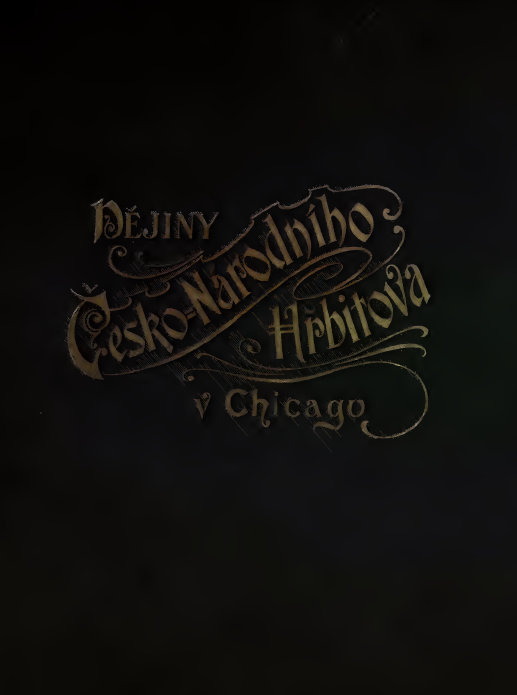
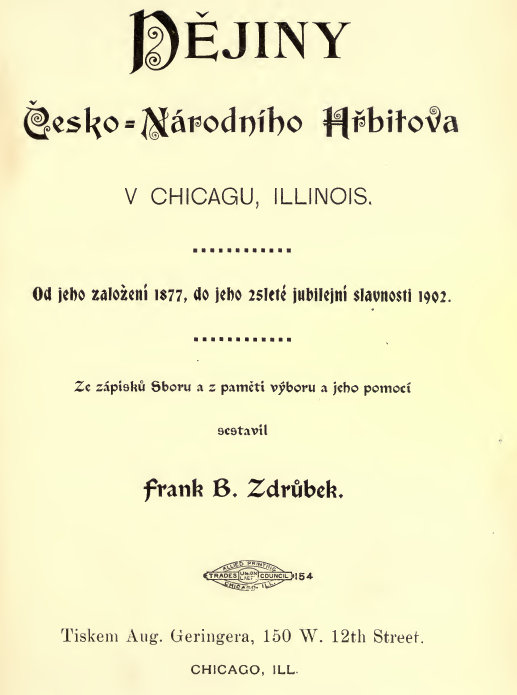
translation from Zdrubek 1902 Bohemian National Cemetery Book
History of the Czech-National Cemetery in Chicago. Compiled by Frank B. Zdrubek
(Book is in Czech, I used Google Translate. Hopefully you can get a sense of Frank Zdrubek's story of the creation of the Bohemian National Cemetery in Chicago. The actual location to begin with was Jefferson Township, which would eventually become part of the City of Chicago.)
Speech
Of all the national enterprises of the Guild of Chicago, who have prepared their housing here for the last 45 years, it is probably the most successful National cemetery, which enjoys the highest favor of Czech and thrives in all respects successfully. Best of all it is good and beneficial for the great gathering of Czech societies, which in the your own benefit for the good of the whole, working together and diligently directly through their representatives on the success of it and proved that the congregation federal and brotherly houses are being built. Conspiracy it was the basis so much good for Czech nationality in the new homeland of this new one, and deserves not only recognition, but also the most moral and material support of everything awake of the Czech Republic.
From the poorest to the great results, the history of this business testifies to the diligence, honesty and dedication of the federal representatives who they did all this work, and on the meritorious recognition of the Czech side the audience in Chicago, which is mostly free-thinking and clinging to the business with his almost religious love. Czech company. The National Cemetery had to break free of the Guilds of Chicago ecclesiastical and priestly arbitrariness, and its purpose is attained in full. The Chicago guilds are their own, and do not roam in the spiritual field estate.
What the fathers have nailed, their children faithfully complete, educate and continue
to master everything!
Page 5
In 1876, in the inner life of the Chicago guilds of great importance changes. There were over 30,000 people in the city who settled densely on the southwest side of the city, and the main center was found near DeKoven and Taylor, where there was a national hall, one on Taylor Street, second to DeKoven, a Catholic church with a school and parish on street DeKoven, printers, weekly "Chicago The "Svornosti" Journal and the Canal Street on those streets, and most Czech traders and craftsmen around this.
It was a year of transition, or rather a year of awakening from the spiritual spirit the great majority of men and women of Bohemia, when they sowed the sowed seed over the past few years to the national role to grow to the bountiful flowers and bore fruit.
Until then, most of the guild adhered to the Catholic confession according to custom from the old homeland brought here, and no one noticed, whether he is true or free in his religion.
In 1876, when the parish of St. Wenceslas settlements on DeKoven Street, Josef Molitor, so he defeated the supportive St. Wenceslas Association and led him with his school building and property, there was a great displeasure among the people against the injustice of the priesthood, especially when the priest was reluctant to do the desired Catholics and time-paid ceremonies. Nor would he allow everyone to be buried in the Catholic cemetery of Ekopol. So it happened with Pi. Mary Šilhánková, dying on July 25, 1876, that the parish did not allow her to be buried in the cemetery, and was Catholic all her life with her family, but she did not confess before death, and they had to bury her in a common cemetery Graceland. Her relative, Mr J. Bambula, wanted to pass her lot on to her cemeteries, but even the parish did not allow. Such pressure exerted back pressure, and it was possible to speak in public that it was time for the echoes have been freed from the priesthood. the echoes take care of it, even after of death they could rest among those whom they lived alive.
Page 6
This was announced by the editor of "Svornosti", Mr. Frank B. Zrurbek, who for The Free Municipality organized public free-minded lectures in the hall The Unity Sokol that he would speak in a lecture on January 7, 1877 on the need for a national cemetery for the echoes. Visit the lectures were plentiful, the speaker condemned the negotiations in strong words the priest and urged those present to embrace the priesthood in all in their own lives, and have not obeyed the dominion of the princes, nor with the names of the children, neither with marriages, nor with their burials.
After the lecture, it was generally discussed at the meeting and it was agreed that a meeting of the early chairmen of all Czech federations would be convened soon settled together, how could a Czech national free cemetery be set up, where every echo could be buried without distinction of religion brothers and compatriots, without asking any priest for permission. The new idea spread quickly across Czech settlements and everywhere about it he spoke with enthusiasm. Everyone calculated how easy the Czech cemetery would be to establish and endure from all connected to it the guild, and no one did not foresee the great difficulties and obstacles that this effort would have to overcome, before reaching the desired goal.
In the following free-thinking lecture in the same hall, there was 21 January again, and a three-member committee was elected Fr. B. Zdrubek, Jan Dušek and M. Polák, who were ordered to invite all Czech clubs in the city, would elect a representative to the public meeting on February 12, would be the subject of a national cemetery thoroughly dealt with.
First steps taken.
This meeting of national associations on February 12 in Jednota Sokol was heavily attended, because many outside the representatives came other fellow countrymen who were at heart and who wanted to be enthusiastic in the first meeting appears to judge the future success of the enterprise.in the first meeting appears to judge the future success of the enterprise. A meeting, it was really excited, so that it gave the essence of best hope. In the meeting, an agreement was reached on the most important question yet for they want the associations to work together, or to leave it to the association one and support it. It was decided by the guilds all together want to take part in the foundation of the cemetery and keep it as a common national property. Resolution this important was to the satisfaction of all those who have not otherwise managed such a business.
The meeting opened at 8 pm. Jan was elected chairman Dušek, and Fr. B. Zdrbek. The present were counted 80, and all the national associations were represented except for two, respectively to the church, they had to bury anyway at the priest's cemetery.
The chairman asked the representatives of the association to apply, it would be known which the federal authorities intend to put their hands on the work of the common, and they set forth the following:
Page 7
1.Jan Morava from the Czech-American Sokol.
2. Jan Rajsler from the Czech-Dlnický Spolek.
3. Jan Beran od Delnickeho Podp. Pole. Association Progress.
4. Matj Karásek from the Czech-Delnický Podpurný Spolek.
5. Martin Baumruker from the Czech-Krejc Association.
6. Prokop Hudek from the Czech Setina.
7. Jakub Pádecký from the Dramatic Society of Thalia.
8. J. V. Benes and Jos. K. Šisler from the Lyra Pveckého Spolek.
9. Václav Zábranský from Podpurný Spolek Jirí.
10. Josef Matoušek from the Podpurný Choir in the Fall of Fire.
n. Fr. Hair from the Czech-Delnicky Equality Association.
12. Jindich Kohn from the Order of Prague. S. P. S.. 13.
13. Josef Svojše from the Order of Equality. S. P. S.. 14.
14. Václav Donat from the Order of Vrnost. S. P. S.. 8.
15. Tomáš Cáp od Slovana,. C Nat. Podp. Choir.
16. Josef Hodoval from Svatojanský Association.
17. Martin Ruzicka od Podp. Spolku Sv. Prokop.
18. Vojt. Freml od Svatováclavského Podp. Choir.
19. Tomáš Petrtyl from the Free Community.
20. Josef Kostner from Tel. Poison. Falcon.
When everyone was given the word to express themselves as a guild its thinking about things, it turns out that they are all unanimous in that we have the cemetery, and that it is best that we take it together, or that there would be no support from the Society for the Enterprise, which would find itself in the hands only one guild, and it could give rise to jealousy and dissolution.
Among others, a representative of the order Prague appeared. S. P. S., Jindrich Kohn, and reported that the Grand Duke of Illinois had already done in the direction of such steps and that for the purpose of the cemetery, he booked 63 acres of land very convenient offered by the company under the same conditions, As he negotiated himself, without earnings, he just mines it to charges despising Guilds who do not belong to any guild have been surrendered great deal. Acre of land that costs $ 550.
The proposal, however, did not find favor with the present representatives of others
because everyone understood that it would not serve the good of the whole, when one association held property and the other were subjected to it some conditions. Everyone promised to work only that all associations have the same right to common property and in his administration, that all be one and the same. Mr. Kohn, seeing that he had not taken any action, announced that he was generous resolved in case the assembled representatives of the association did not intend to unite with him and take over the land mentioned above, he himself from the business he will drop his work, and he will work with the same with others all of them. The announcement was received gratefully, because some of them came from fear that the great work begins in the foundations of its disruption. But this soon disappeared.
Page 8
Following further discussion, the following resolution was adopted:
- To choose a trio committee to look around the city and find
convenient location close and cheap for sale for the Czech cemetery. - That the committee consisted of pp. Fr. Bedlan, Mat. Karáska,
and Stepan Sramek, and 14 days from today to report to the meeting, how - So that all the representatives of the clubs meet again Monday Monday 26.
They would hear the report of their three-member committee
on land, and then consulted on what message to bring the churches
So it ended an important meeting with unexpected success, or if he were the best lawyer he plotted the course of the meeting of so different elements composed, it would not be wiser to draw up a schedule of negotiations, than our people did without any special guidance.
On the 26th of February, 40 representatives met in the evening and signed up also Mr. Jan Beran as a representative of the Czech-Brotherhood Corps i was received. Then he submitted a report on the search for the land that he had looked together with Mr. J. V. Benes, builder, in his wagons three lands on three from all the sides of the city, and pleased the people present preferably report the first plot 10 miles from the center of town distant five miles west of Jefferson, 110 acres, about after $ 125 acre, total $ 13.000; road to land good up to half a mile that would have to redeem and do. Ordered to keep this single plot in mind, because the other both aren't that important.
At the same time, a committee of five was elected at this meeting to form a future committee schuze sketch of the statutes of the cemetery association. They were elected
Jos. Matousek, Prokop Hudek, Vojtch Freml, Jos. Svojše, and Jan Ram. The chairman and the secretary were asked to subordinate the authorities to the future meeting before the new officials are elected.
Cemetery Society founded
On 12th of March 1877, all the previously registered representatives of the following eight met to establish and establish a real national cemetery. They were:
- From Tel. Unity Sokol p. Moritz Polácek.
2. From Czech-Deln. Podp. The choir of Mr. Frant. Working.
3. From the Order of Equality. 14. C.S. S. S. Josef Novák.
4. Odc esko Nar. Podp. Choir Mr. Josef Dostal.
5. From Podp. The association in the fall of fire Mr. Josef Matoušek.
6. From Podp. Spolku Sv. Prokop Mr. Vojta Freml.
7. From Podp. Spolku Sv. Vaclav p. Stepan Sramek,
8. From Delnického Podp. Pole. Prokop Hudek Association.
Page 9
Some of the other clubs first registered were read letters and apologies that they cannot participate yet, but that they wait to say: and they shall not depart in any way from the support of that enterprise.
It was then established to establish a society, and Mr. Frank Pracna was elected For the President, Mr Prokop Hudek for the note. Right from the front provided that meetings of the national cemetery be made public, everyone could be present at all meetings, and only the deputy members can speak and vote.
Then, one by one, they told each other how much their association wanted lending to the company, so they signed up for $ 1,325 in the first meeting. Resolved, that the current committee of eight federal representatives consider themselves and be considered he was behind the Cemetery Committee to provide the statutes with the help of a lawyer for the cemetery association, and to stop working for its intended purpose.
What has so far progressed in committee so far, they have heard voices that are both nasty and loose, lightening and deterrent, suspicious. Perhaps nobody could get such a conversation, but they did it just to destroy what appeared to be to be one great national building. Similar obstacles set in the way of the committee lasted quite a long time before it even had to silence. The Committee mainly referred to the fact that it was a national enterprise all the associations, that no single association will look for its own profit, but the common good, and that the business is not an excuse for anyone, but for the benefit and benefit of the entire Czech population in Chicago. Also pointed out that what would once get a certain amount of business but it shall not be alienated from our nationality again to her upliftment, so that many other national and educational the Czech company will be able to acquire from this support. As if he was this poor committee could see the future and count the hundred dollar, which the Cemetery choir gave for certain purposes for national purposes and educational Czech.
So we see that he defended and defended against all of them The Committee has a sound basis on which to stand. It was publicly interpreted in the sense of the "Svornosti" diary and privately from the zealous members of the committee and friends of the business until finally defamation and malice they were exhausted and stopped by themselves, for they felt helpless to defeat the business that so many national associations had been committed to. Meanwhile, the committee accepted from the St. Wenceslas Corps offered to him a school room on DeKoven Street at the very rectory for his meetings, and on March 16th the meeting was told by a lawyer that the committee must before the state state what the corps (incorporate) and then it can be established to be a cemetery, where the towers allow it. Saved thus pp. Hudek, Matoušek and Novák to enter the state incarnation. They pushed for it and on April 11, the incarnation was confirmed in Springfield, and the governors were Newly elected committee pp. Jos. Matoušek, Št. Šrámek and Jos. Novák, who have already been elected as the Administrative Committee for a full year. Chairman then Mr. Matj Karásek, Secretary of Mr. Fr. Fenzl, the accountant Mr. Fr. Working, and treasurer Mr. Jos. Dostal..
Charter of the Czech-National Cemetery.
State of Illinois, Union State. George H. Harlow, Secretary of State.
To all who will read this, a warm greeting: Because it will come to pass duly signed and confirmed was entered into the secretary's office State on 11 April 1877 establishing the Czech National Cemetery The Board in accordance with the provisions of the "Act on Corporations" approved 18 April 1872 and in force as of 1 July 1872, whose testimony a copy is added; therefore I, H. Harlow, Secretary of State Illinois, by my powers conferred upon me by law, I testify that the "Czech National Cemetery Corps" is to establish an established one corporations under the laws of that state.
In witness whereof I have given the state seal. (Seal.)
Dated in Springfield, on April 11, L.P. 1877 and the Inevitability of the Centenary and the First.
George H. Harlow, Secretary of State.
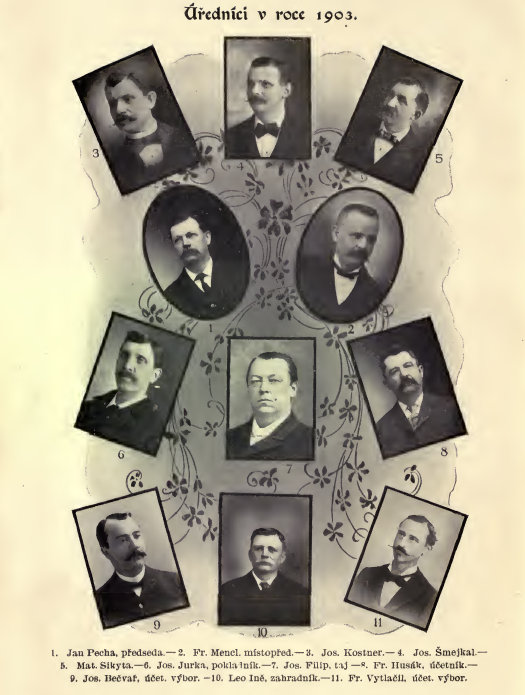
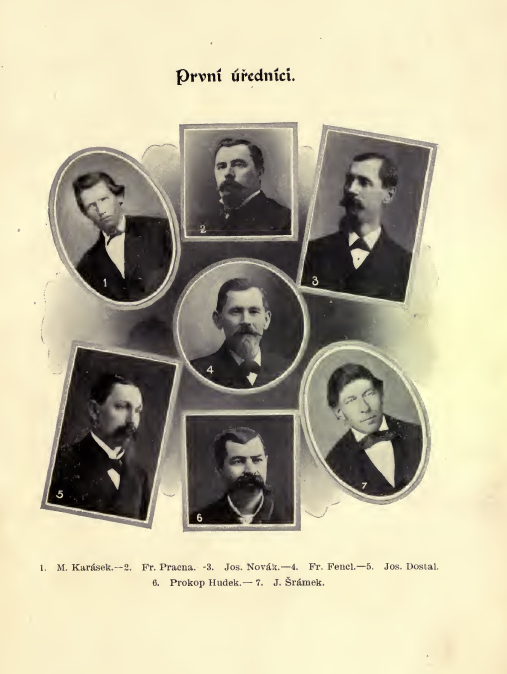
Jan Habenicht's 1904 book, appears in my opinion, to have a favorable review of the Catholic Church and all of its participants. But a rather dim view of Free Thinkers. Frantisek Zdrubek and August Geringer are described differently in Havenicht's book. But August Geringer's brother John remained Catholic and is portrayed in a different light.
Dejiny Cechuv Americkych (The History of the Bohemia of America)
Writer
Jan Habenicht
S Mnohymi Obrazy (With Many Images)
V St. Louis Mo. (In Saint Louis, Missouri)
Tiskem A Nakladem Casopisu,. Hlas PRINT AND LOAD OF MAGAZINE REPORT
Veslera Prava Vyhrazena Rights Reserved
1904
Translation of pages by Google Translate – Decent work, you will get a sense of the article.
Pages 575 –
It was mentioned in 1867. František Boleslav moved to Chicago Zdrubek was born on 26 July 1842 in Bezdedice near Hostomice. In 1857, he entered the Old Town Gymnasium and, from the sixth grade, went to the Convent of Merciful Brothers in Graz. However, he left the monastery and attended the seventh and eighth grades of gymnasium in Prague; after that he became a theologian of the Catholic Theological Faculty in Prague and later studied at the Protestant school in Basel, Switzerland. He joined Chicago in May above that year, he settled in Caledonia, Wisconsin, and served two churches "Czech-Moravian Brethren": one in Caledonia (see Caledonia in Wisconsin) and the other in Chicago, but secretly edits the unbelievable "Progress" magazine in Racine, Wisconsin. In 1869, he managed it in Cedar Rapidsích iowa. (See Cedar Rapids, low.) In 1871, he moved with "Progress" to Cleveland, Ohio, which will be mentioned in the history of this city. In the same year (after the court with P. Repiš) went to Guild. He stayed there for 4 months and then set out on a journey to Texas with the deceased Tom. Batlou, a farmer from Catspring, Texas, who founded it. (See Wesley, Tex.)
He was then in Houston, Texas a typesetter in an English letter, then a teacher
and evangelical preacher in Wesley, Washington. In September 1874. became editor of the "Progress of the West" in Omaha, Nebraska, and in October 1875. editor of the daily newspaper "Svornosti" in Chicago.
In 1877, a Czech Catholic priest in Chicago called for a public debate on things
religious, and the invitation it accepted today already deceased P. Vilém Coka, then
parish priest of st. Prokop. Two public religious disputations were held on 17 and 19 April of that year at St. Wenceslas Parish School on De Koven Street in Chicago. Some lasting result was not achieved through these talks.
Zdrbek is a remarkable phenomenon in the Czech-American society at all
and free-minded in particular. His characteristics can be summed up in the words: ambition, selfishness, impatience, infidelity of the coarsest grain, frenzied diligence in everything it is aimed at combating every religion, but Catholic in particular, the ruthlessness in the choice of weapons, the educated man of the insatiable, and the greed of the reason. Looking at Zdrubek as the chief and foremost propagator of the unholy principles among the Czech people in America with the views of his supporter, we can see that his party has greatly esteemed him. He had only worked with all the unprecedented effort, the better things, only when it was the propaganda of unbelief doctrines, of which he liked the teachings of the deceased American, the atheist Robert Ingersoll. For the thing he defends, he works both in the press and in lectures, not forgetting any opportunities to remind the people in any way that all religion is superfluous and harmful and that it is only in the doctrines of the free-thinking
the thinker (the infidel) lies the salvation and welfare of humanity.
If he means it sincerely, there can be doubts about this, because the motives that led him to join the paths taken were not ideal, but purely material, which can easily be explained by the fact that, in proclaiming materialism, the principles of these naturally also favor them, cleverly enjoyed. As for the way in which the scholars disbelieve, it is necessary to point out that he is not free-minded. Zdrubek in his treatises and public lectures cynically, the promoter of principles (which he thinks are good) completely impermanent, spread the hatred of compatriots against compatriots, if they happen to advocate any other conviction than unbelief. Tim it happened that his activities among the Guilds in America were neither beneficial nor socially beneficial. Zdrubek with a few others - and especially him - tore us apart against each other, and the old Czech sincere social life greatly damaged. Above all, we must realize that the doctrine of his supernationality, which stems from the fact that he devoted all his strength to combat the religion of the Czech people and Czech priests. However, he did not forget to cause his party to establish "free" municipalities in which adherents of unbelief organized themselves and they were taught some sort of greedy "morale." Not original. He has infidelity and all the doctrines he preached from others, but in that is the original, actually in our people he founded a new sect with various mindless ceremonies, and thus became the supreme sectarian head of Czech infidels. He was also forced by law to "parish" of the unbelieving community, adopted the name "reverendus," before him so obnoxious and so hated by him.
Zdrubkova's star, however, has already faded, but the old infidel has not yethe will admire the times when he was considered the leader of all the greedy Guilds in America, and when he was oppressive in the minds of those who believed him to say better education, and a better pen.
Zdrubek as soon as possible will be a forgotten quantity to be discussedonly among those who did not know his silence, his character and his unholy fanaticism, from which he had knocked out capital for himself. And in that case it belongs to himreal merit.
As for the literary activities of František B. Zdrbek, note here there are so many: Zdrbek did not write the original works, except for books, silencers and the like was mainly active as a pioneer and compiler. In this respect, Zdrbek performed quite, adjust both for "Svornost" and "Spirit of time," for "Svojana" a whole series of greedy and "free-thinking" treatises and "sermons." But these works are written in a rough, gritty style, dressed in a nasty Czech robe, and in the way of a scholarly propagator of free-thinking ideas, not too oppressive. ”
In Omaha, he published a pet book "The Matrix of Freedom." Then he wrote, "The First Booklet for American Schools," and in Chicago, the "Second Booklet for Czech-English Schools," serving "History of the Congregation of America." He also published in Chicago: "The Speaker English Speech,"" English Grammar "" Czech Spelling Tutorial, ""Two Religious Public Quarrels with P. Coca," "The Position of a Woman in the Church," "Preaching of the Holy Faith," The Hell of "The Age of Reason" by Thomas Pain, a poor translation of Strauss "The Life of Jesus," translation of Buechner's "Powers and Matters," "The Texas State Institute," "Pocket English-Czech Dictionary," "Assign Grammar English "and other pens in which he spread disbelief among the echoes. At the same time edited 1871. "Organ of the Unity of the Freedom" and now publishes the proceedings "Svojan."the fruit and him in the History of the Guild of America in which he must look true national work — let's be declared a place quite infamous.
